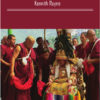The Buddha intended his philosophy to be a practical one, aimed at the happiness of all creatures. While he outlined his metaphysics, he did not expect anyone to accept this on faith but rather to verify the insights for themselves; his emphasis was always on seeing clearly and understanding. To achieve this, however, requires a disciplined life and a clear commitment to liberation; the Buddha laid out a clear path to the goal and also observations on how to live life wisely. The core of this teaching is contained in the Noble Eightfold Path, which covers the three essential areas of Buddhist practice: ethical conduct, mental discipline (‘concentration’ or ‘meditation’), and wisdom. The goals are to cultivate both wisdom and compassion; then these qualities together will enable one ultimately to attain enlightenment. The path is laid out in eight steps, but one may practice all of the steps simultaneously, since they work together. The first two steps or factors constitute Wisdom. The next three steps on the eightfold path constitute ethical conduct. The last three steps on the path are those which promote mental discipline. Right effort is the will to cultivate wholesome states of mind and eliminate evil or unwanted ones. Right mindfulness (or attentiveness) involves being keenly aware of the processes involved in one’s daily existence, those of the body, the sensations, the mind and the experiencing of thoughts and ideas.
Buddhist Moral Philosophy is a philosophical introduction to the teaching of the Buddha. It carefully guides readers through the basic ideas and practices of the Buddha, including kami (karma), rebirth, the not-self doctrine, the Four Noble Truths, the Eightfold Path, ethics, meditation, nonattachment, and Nib Bana (Nirvana). Mindfulness is practiced in Buddhist forms of meditation such as vipassana, through techniques like observation of the breath and bodily sensations. Right concentration refers to the progressive stages of Dhyana (this is closer to what is called meditation in most Hindu traditions). In this discipline, the mind is gradually cleared of passionate desires, then thoughts, then finally even feelings of joy, until only pure awareness remains, in a state of perfect calm and equanimity.












